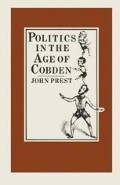Abstract
Consistently with the stand they had taken while they were in opposition, Peel and his Ministers appear to have resolved, in 1844, to remodel the Irish registration system as closely as possible upon the English one. The revision was to take place every year, the solvent tenant test was to be re-enacted in its English form of ‘clear yearly value’, and both disappointed claimants and disappointed objectors were to be allowed to lodge appeals with the judges of the Court of Exchequer sitting in Dublin.1 Thus far there were no surprises, and the draft Bill was not a conciliatory one. But Peel was tiring of party, and in an attempt to lay it to rest he conceded that existing electors should be allowed to remain on the registers until their certificates expired.2 Most important of all, the government recognised that strict enforcement of the clear-yearly-value test would disfranchise anything up to two-thirds of the present electorate, and accepted the necessity to change the franchises.3 Accordingly the Ministry proposed to lower the qualification for a freeholder from £10 to £5.4
Access this chapter
Tax calculation will be finalised at checkout
Purchases are for personal use only
Preview
Unable to display preview. Download preview PDF.
Notes
Bright, PD 3 ser. CV 1196, 5 June 1849; J. A. Langford, Modern Birmingham and its Institutions vol. 2 (Birmingham, 1877) pp. 160–1.
E. J. Cleary, The Building Society Movement (1965) pp. 50–1.
Sir Harold Bellman, Bricks and Mortals (1949) p. 39.
W. W. Barry, A Treatise on the Law and Practice of Benefit Building and Freehold Land Societies (1866), p. 151.
G. M. Trevelyan, The Life of John Bright (1913) p. 184.
F. E. Gillespie, Labor and Politics in England 1850–1867 (Durham, N. Carolina, 1927), p. 95, note 1.
Cobden to James Taylor, Warwick and Warwickshire Advertiser, 7 Oct 1848.
H. F. A. Davis, The Law of Building and Freehold Land Societies (1870) pp. 310–11.
R. G. Gammage, History of the Chartist Movement 1837–1854 (Newcastle, 1894) pp. 192–3.
David J. V. Jones, Chartism and the Chartists (1975) pp. 90–1.
See Joy MacAskill, ‘The Chartist Land Plan’, in Chartist Studies, ed. A. Briggs (1959); and
A. M. Hadfield, The Chartist Land Company (Newton Abbot, 1970).
For the development of party activity, see especially Ostrogorski, Democracy and the Organisation of Political Parties (1902); C. Seymour, Electoral Reform in England and Wales (New Haven, 1915);
J. A. Thomas, ‘Registration and the Development of Party Organisation 1832–1870’, History, 1950;
N. Gash, ‘Peel and the Party System’, Transactions of the Royal Historical Society, 1951; and ‘F. R. Bonham: Conservative “Political Secretary” 1832–47’, English Historical Review, 1948; and
C. O’Leary, The Elimination of Corrupt Practices in British Elections 1868–1911 (Oxford, 1962).
I am grateful to Professor Nichol Cooper for calling my attention to John Medway, Memoirs of the Life and Writings of John Pye Smith (1853) p. 384.
Seymour, Electoral Reform; Thomas, Registration; and H. J. Hanham, Elections and Party Management (1959) p. 399.
For the registration in Scotland, see especially John Cay, An Analysis of the Scottish Reform Act, with the Decisions of the Courts of Appeal, 2 parts (Edinburgh, 1837 and 1840);
W. Ferguson, ‘The Reform Act (Scotland) of 1832: Intention and Effect’, Scottish Historical Review, 1966;
Papers on Scottish Electoral Politics 1832–1854, ed. J. I. Brash (Edinburgh, 1974), which is excellent.
Ibid., chapter 8; and, for the Reform Act, D. C. Moore ‘Concession or Cure: The Sociological Premises of the First Reform Act’, Historical Journal, 1966.
Author information
Authors and Affiliations
Copyright information
© 1977 John Prest
About this chapter
Cite this chapter
Prest, J. (1977). Had the Corn Laws Not Been Repealed So Soon. In: Politics in the Age of Cobden. Palgrave Macmillan, London. https://doi.org/10.1007/978-1-349-03473-4_6
Download citation
DOI: https://doi.org/10.1007/978-1-349-03473-4_6
Publisher Name: Palgrave Macmillan, London
Print ISBN: 978-1-349-03475-8
Online ISBN: 978-1-349-03473-4
eBook Packages: Palgrave Political & Intern. Studies CollectionPolitical Science and International Studies (R0)

